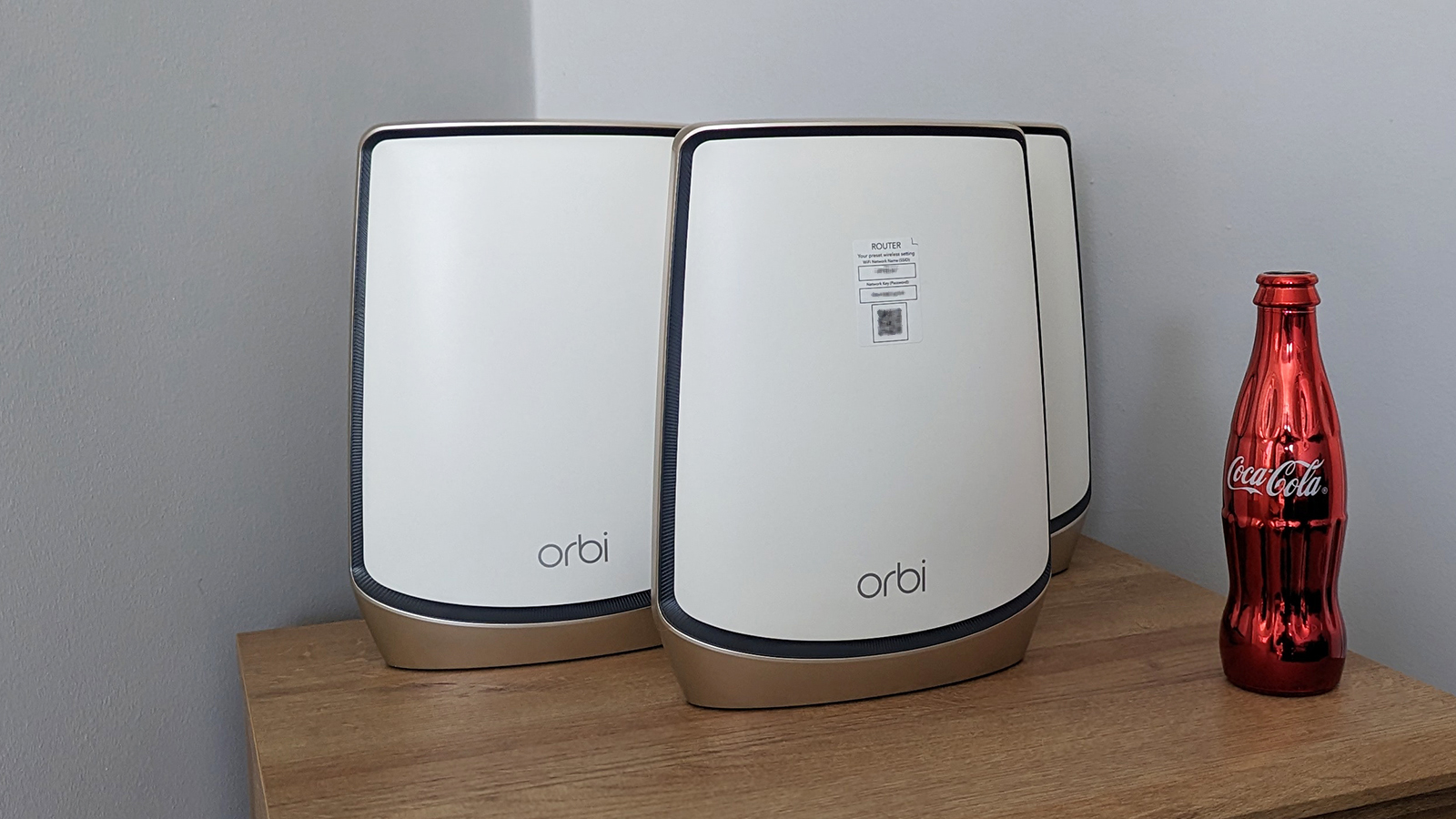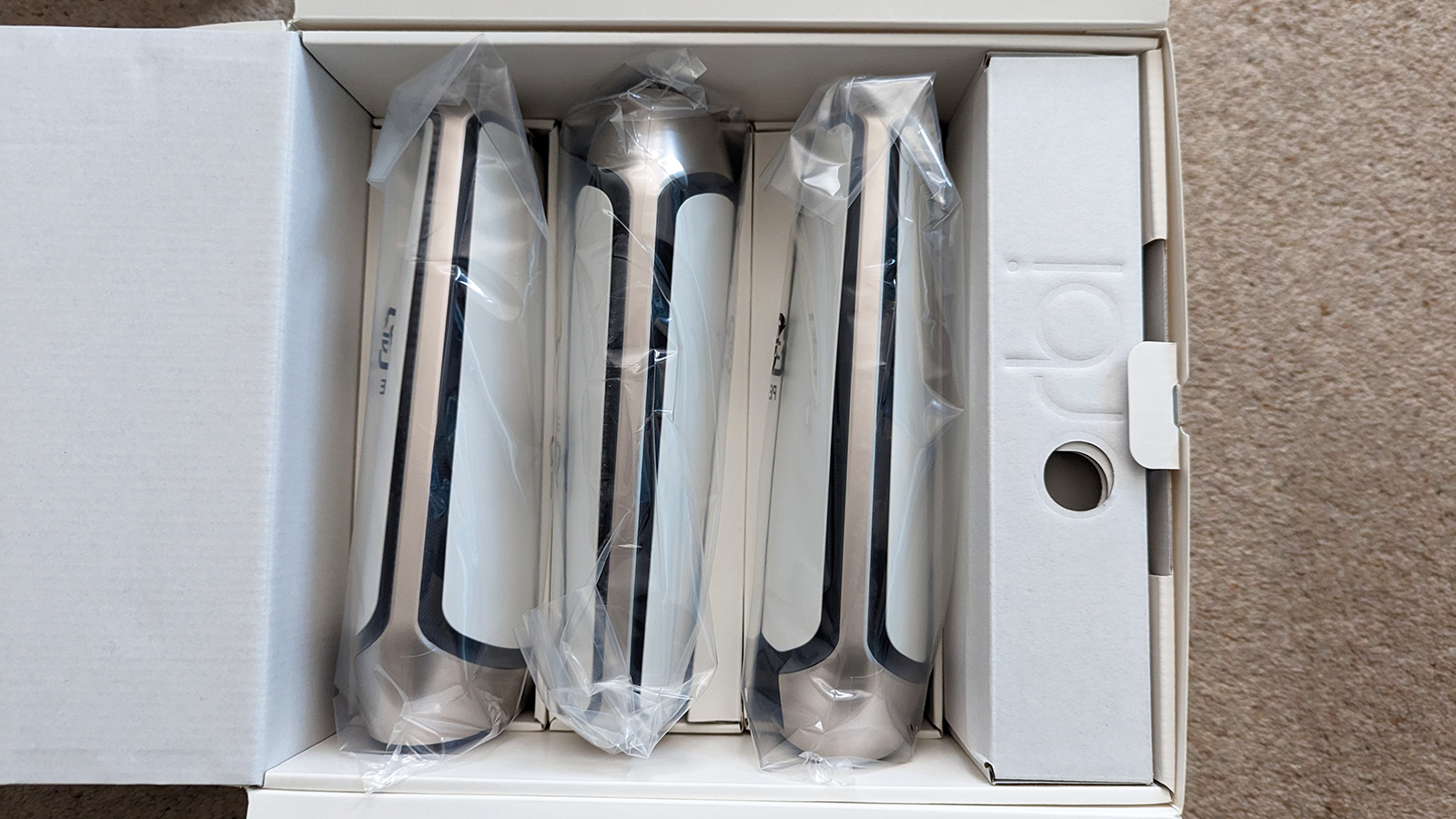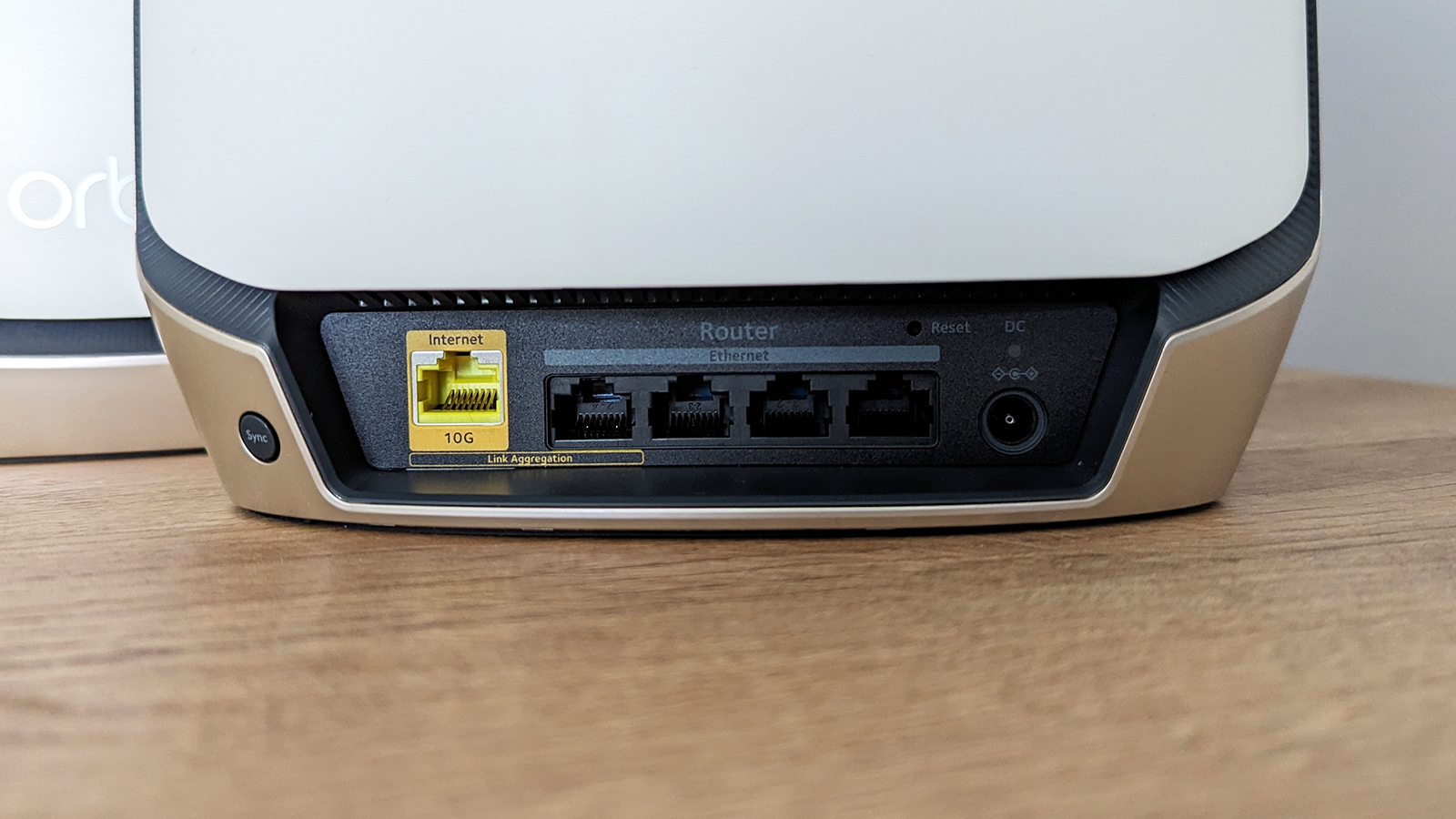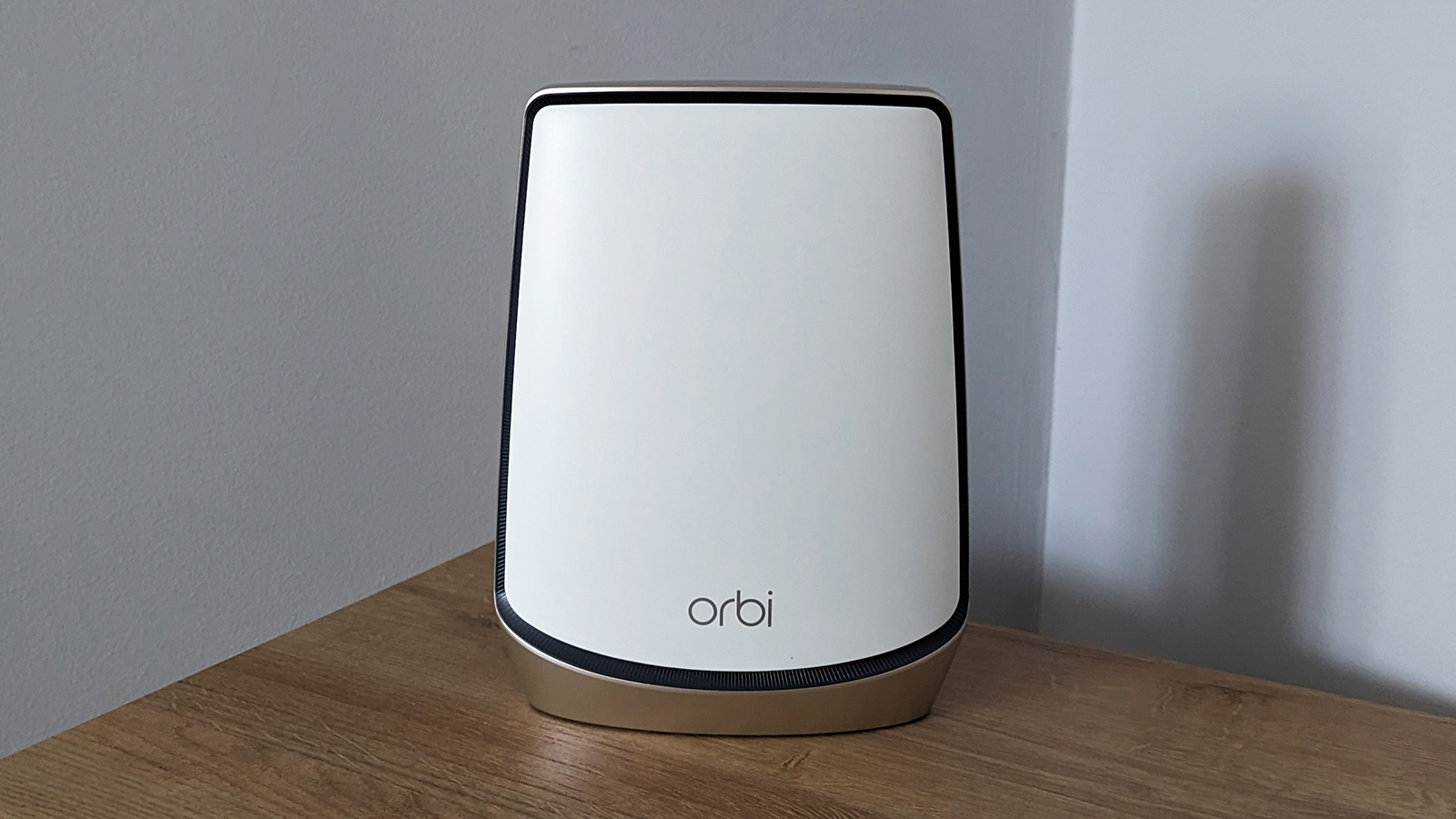Netgear Orbi RBK863S review: high-end Wi-Fi at a high-end price
The Netgear Orbi RBK863S is the new top option in the Orbi series as far as Wi-Fi 6 mesh systems go


The Netgear Orbi RBK863S is a mesh Wi-Fi system that'll bring speedy Wi-Fi (and wired internet) across a wide area. Whether it's the best option for you depends on your broadband package, your exact requirements, and how much you've got to spend.
-
+
Top speeds
-
+
Simple setup
-
+
Very reliable
-
-
It costs a lot
-
-
No Wi-Fi 6E
-
-
Large units
Why you can trust T3

If you're in the market for one of the best mesh Wi-Fi systems around, then you'll want to weigh up the Netgear Orbi RBK863S pack, which includes a main router and two satellite nodes. It's an upgrade on the previous Netgear Orbi 850 series, if you're keeping track.
There are a lot of connectivity options here, including tri-band Wi-Fi and multiple wired Ethernet sockets, and everything is handled through the Netgear Orbi app as usual. This is most likely a substantial upgrade over the router that came with your broadband deal.
In this detailed Netgear Orbi RBK863S we'll explain everything you need to know about this mesh Wi-Fi system for you. For more context, we'd also recommend checking out our comprehensive guides to the best Wi-Fi 6 routers and the best wireless routers.
Netgear Orbi RBK863S: price & availability
The Netgear Orbi RBK863S package is out and available to buy now: the three-pack that we're reviewing here is going to set you back around £1,100 in the UK and $1,100 in the US. Check the widgets embedded on this page for the latest deals on the web, which might enable you to get the hardware for less. In the UK, you can get the kit direct from Netgear too.
Netgear Orbi RBK863S review: design and setup

The Netgear Orbi RBK863S system is going to be familiar to anyone who's seen a Netgear Orbi system before: these tall, slab-like routers and satellites haven't changed much down the years. Aesthetics aren't all that important when it comes to mesh systems, but there's a certain amount of elegance to these units, even if they are on the large size.
Specifically, both the main router and the satellites measure 254 x 191 x 71mm and weigh 1.29kg a piece. Unlike some other mesh router systems that we've seen, you can't really hide these Orbi RBK863S units away on a shelf or a desk – you really need a bit of space and planning to accommodate them. You can pick up this system in either white or black, if the colour is going to be important to you.
Setup is handled via the Netgear Orbi app on your phone, which again is similar to previous units in the same range. It's not the most polished app that we've ever come across – it doesn't have the slickness of something developed by the likes of Google, Amazon or Apple, but it does the job. The app will advise you about the best places to put the satellite nodes, and you should be ready to go with your new Wi-Fi network about 15 minutes after unboxing the kit.
It's worth pointing out that this pack comes with a year's subscription to Netgear Armor, which gives you a host of additional security features, including access to a Virtual Private Network (VPN), a firewall, network vulnerability scans, and advanced threat protection for all of the devices on your network. If you want to keep using it after the initial 12 months, it'll cost you £85 or $100 for another year.
Netgear Orbi RBK863S review: performance and features

With the three-pack that the Netgear Orbi RBK863S offers, you get coverage of up to 8,000 square feet (that's 743 square metres), which should be enough for most homes. Wi-Fi speeds of up to 6Gbps and wired speeds of 10Gbps are possible, although this is going to depend on your broadband connection and the hardware you've got. There's no support for the latest Wi-Fi 6E – this tops out at the almost-as-good Wi-Fi 6.
Besides speeds, one of the advantages of a mesh system is that you can connect a lot more devices: up to 100 are supported on this hardware set, and while we weren't able to test it right up to that limit, we did add dozens of devices without a hitch. The four 1Gbps Ethernet ports on each satellite help with connectivity, as does the dedicated backhaul channel which means the nodes can communicate with each other without interference.
While we don't live in the hugest of properties – a two-storey semi-detached – the Netgear Orbi RBK863S performed flawlessly when it came to getting Wi-Fi out to every corner of the house, even into the garden (something our existing Sky mesh network couldn't manage). We tried as best as we possibly could to overload the system, but video streaming and downloads stayed rock solid.
Clearly you're going to need one of the best broadband packages in your area to take full advantage of everything that this system can offer, so factor that into the price. However, if you do have the spare cash to spend this much on a mesh Wi-Fi system, then the Netgear Orbi range continues to be one of the best options out there – whether or not you're an expert in home networking.
Netgear Orbi RBK863S review: verdict

A step below the Netgear Orbi RBKE963 series, this is almost the top-of-the-range mesh networking system from Netgear – so as you would expect performance is pretty much fantastic across the board. If you need fast speeds across a wide area for a lot of gadgets, then this is certainly going to deliver, and it mostly takes care of itself in terms of setup and maintenance as well.
The question is whether you need a kit that's this expensive though. It's the same price as a decent laptop. And there are a lot of cheaper mesh systems around if your needs are a bit more modest (and don't include a need for a 10Gbps wired Ethernet, for example).
Add in the lack of Wi-Fi 6E – not a disaster, but not great for future-proofing – and an app that remains rather underwhelming, and we can't give the Netgear Orbi RBK863S a very top score. It does rather brilliantly at getting internet around the house, which is of course what's most important, but there are a few issues around the edges that you need to know about before buying.
Also consider
There are lots of other mesh systems out there to choose from, many of them made by Netgear. We've already alluded to the Netgear Orbi RBKE963, which we described as "the ultimate mesh Wi-Fi system" in our review. It does have support for Wi-Fi 6E, and specs that are even better than the Netgear Orbi RBK863S, but you're going to have to pay even more to get hold of it.
At a more affordable level, the Amazon Eero Pro 6E brings Wi-Fi 6E to every corner of your home for a few hundred pounds (or dollars) less than the Netgear system we've reviewed here. What you lose out on are some of the extras, such as additional security features and extra Ethernet ports, and the coverage area isn't quite as big. For a lot of users, however, the Amazon Eero Pro 6E might be more than enough.
Get all the latest news, reviews, deals and buying guides on gorgeous tech, home and active products from the T3 experts
Dave has over 20 years' experience in the tech journalism industry, covering hardware and software across mobile, computing, smart home, home entertainment, wearables, gaming and the web – you can find his writing online, in print, and even in the occasional scientific paper, across major tech titles like T3, TechRadar, Gizmodo and Wired. Outside of work, he enjoys long walks in the countryside, skiing down mountains, watching football matches (as long as his team is winning) and keeping up with the latest movies.
